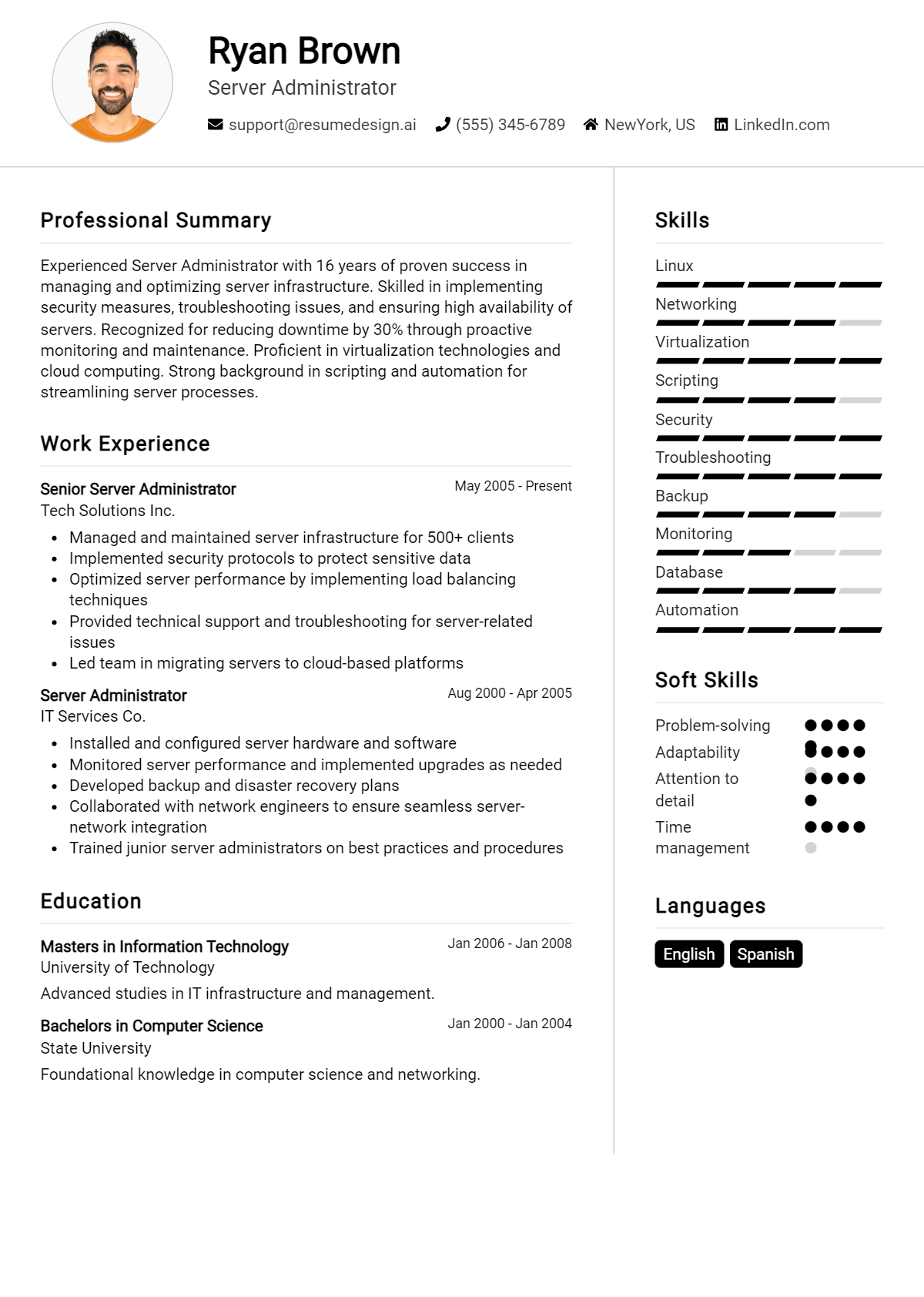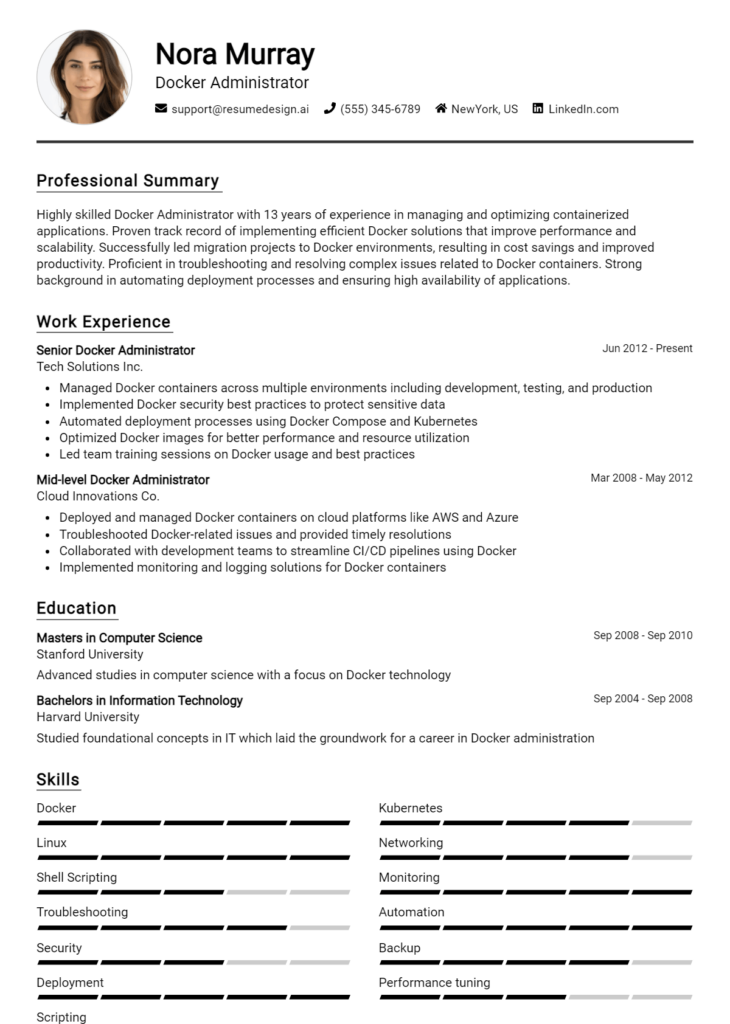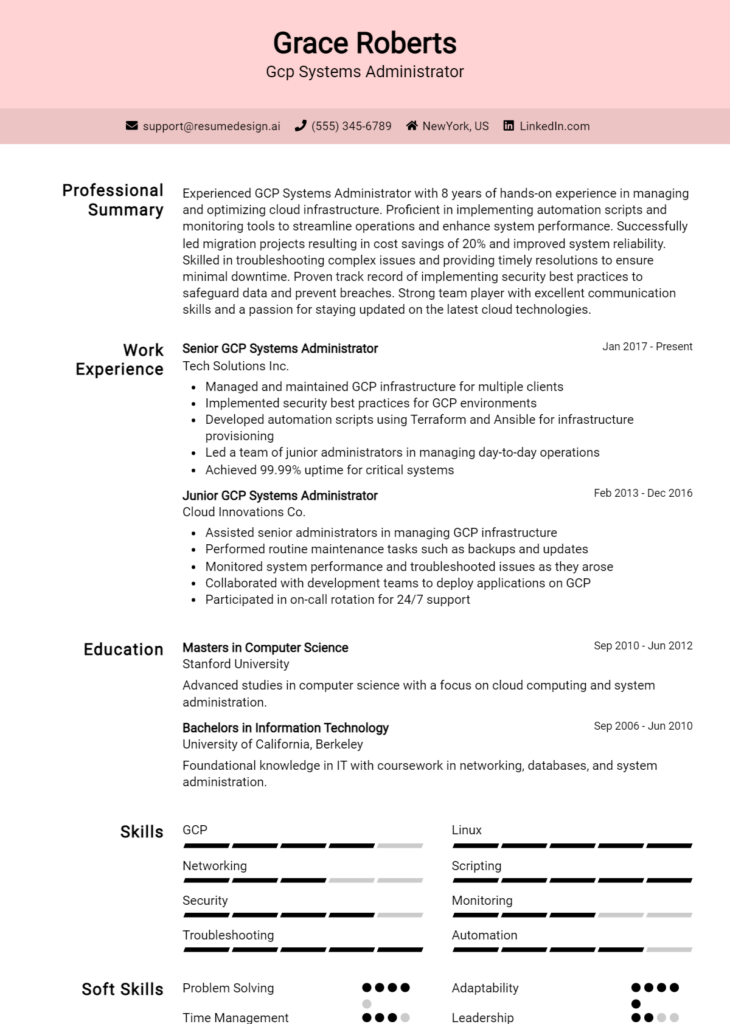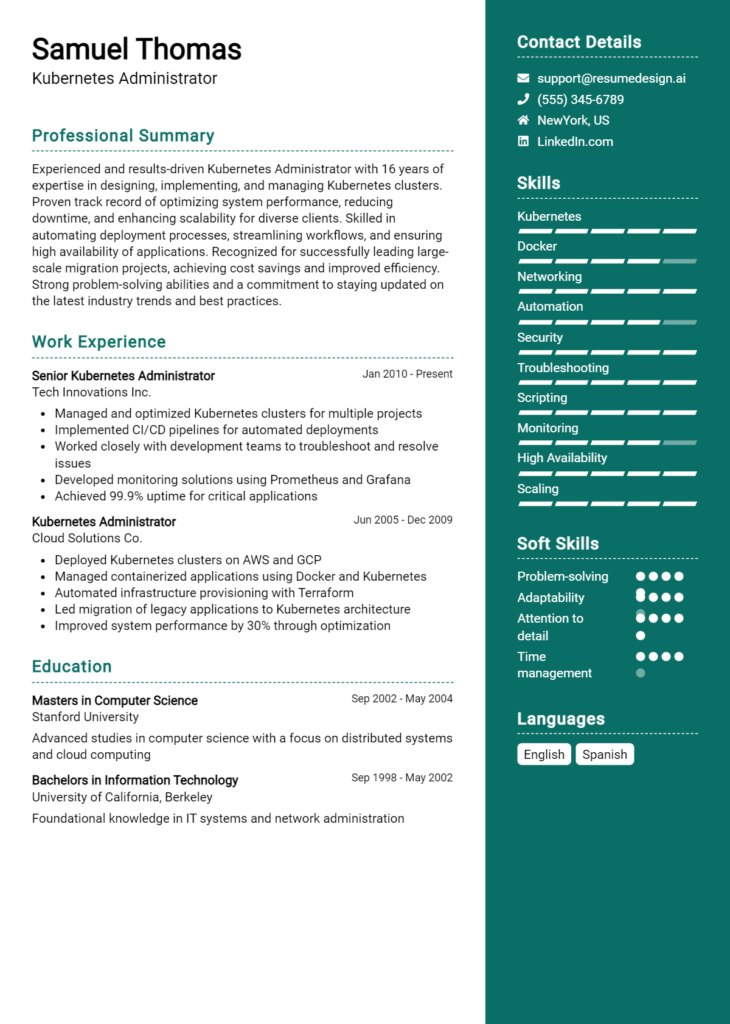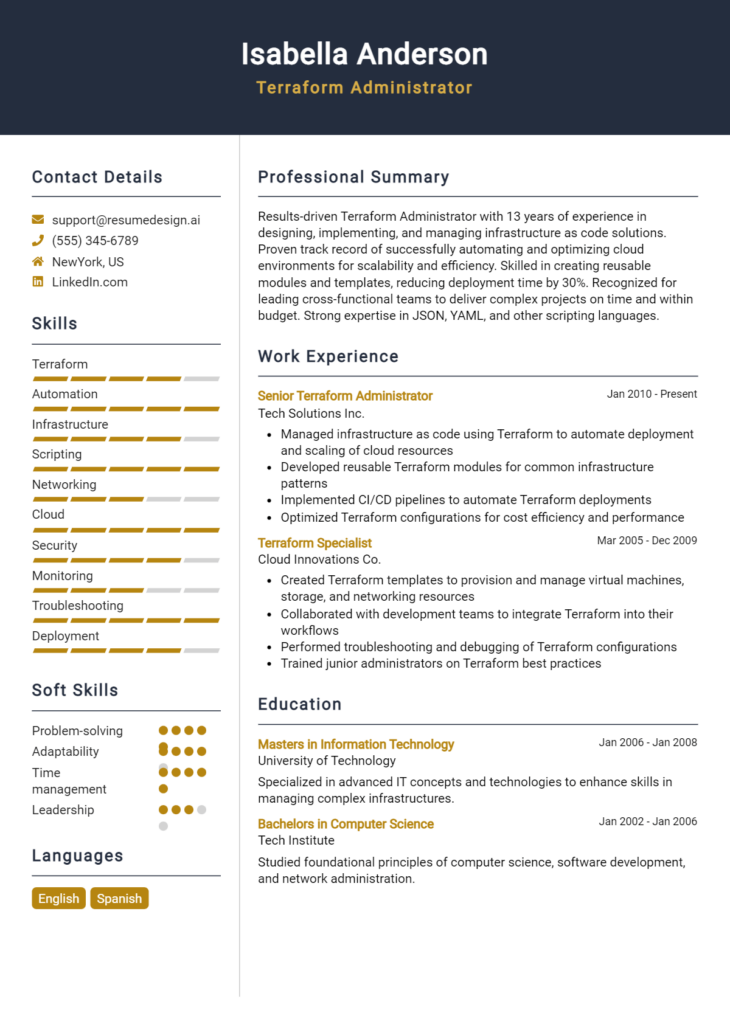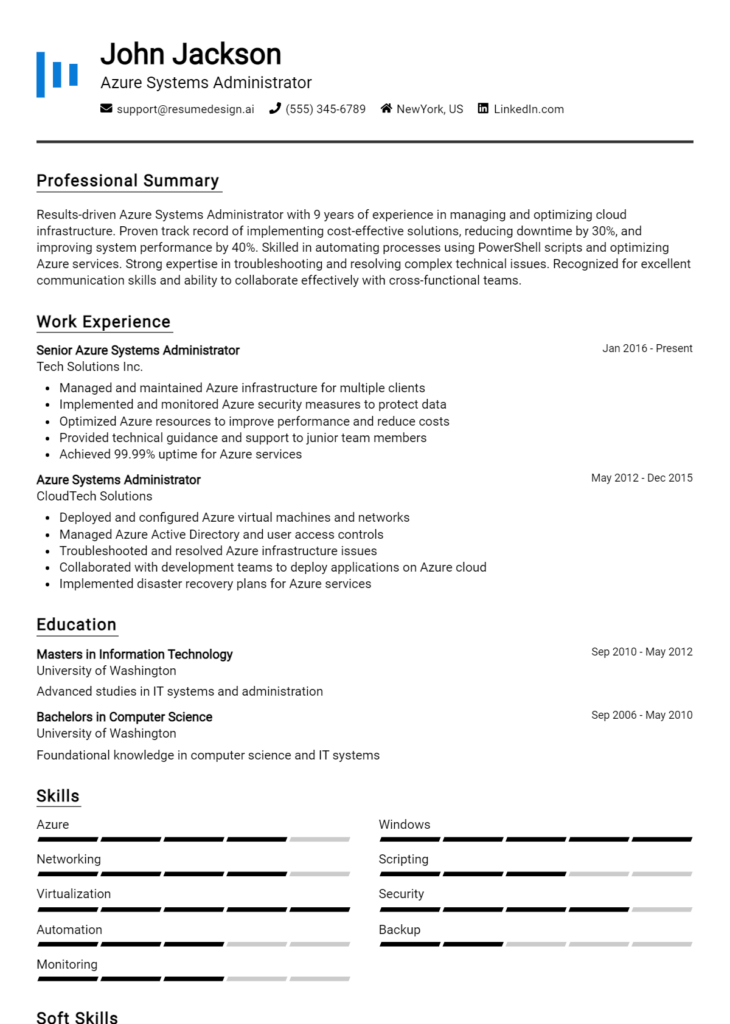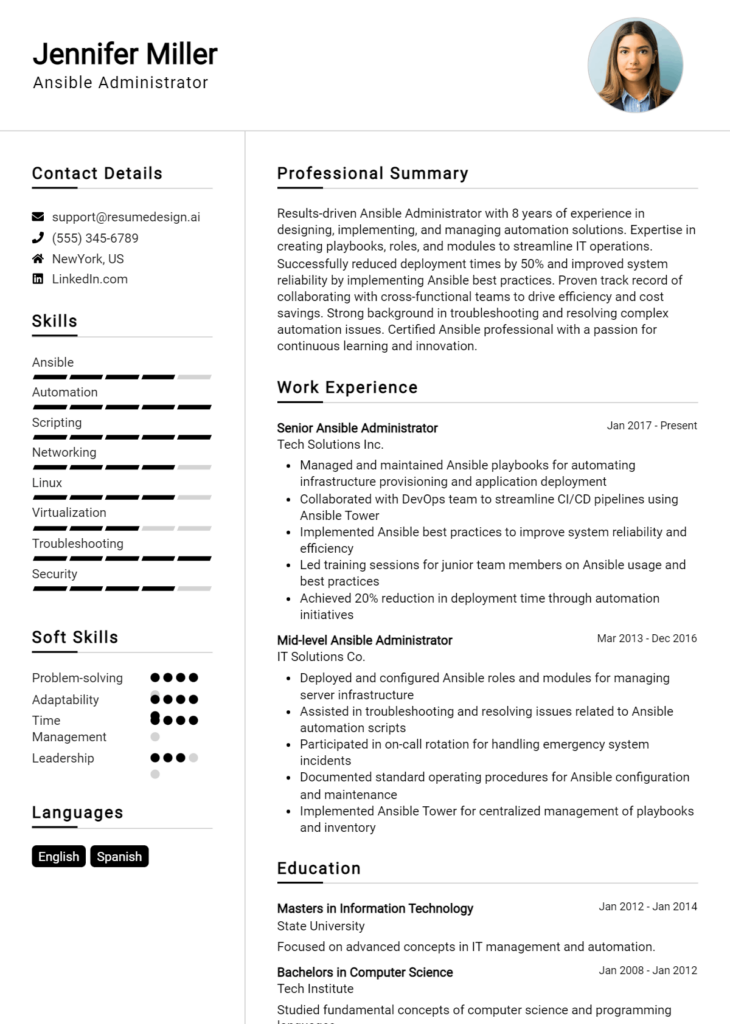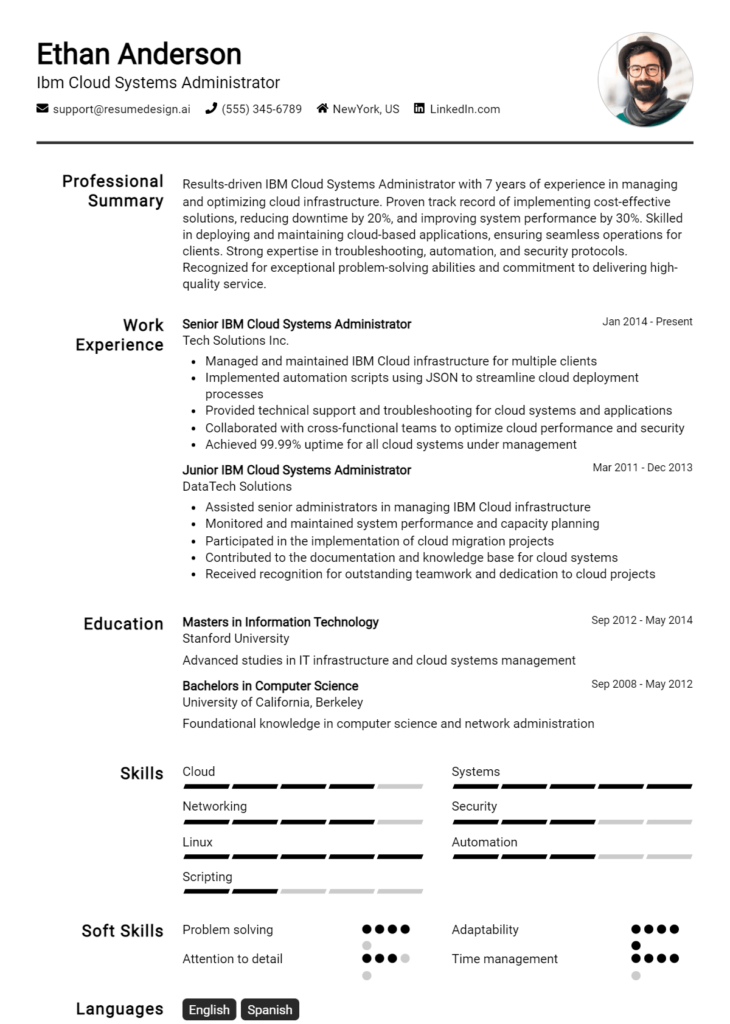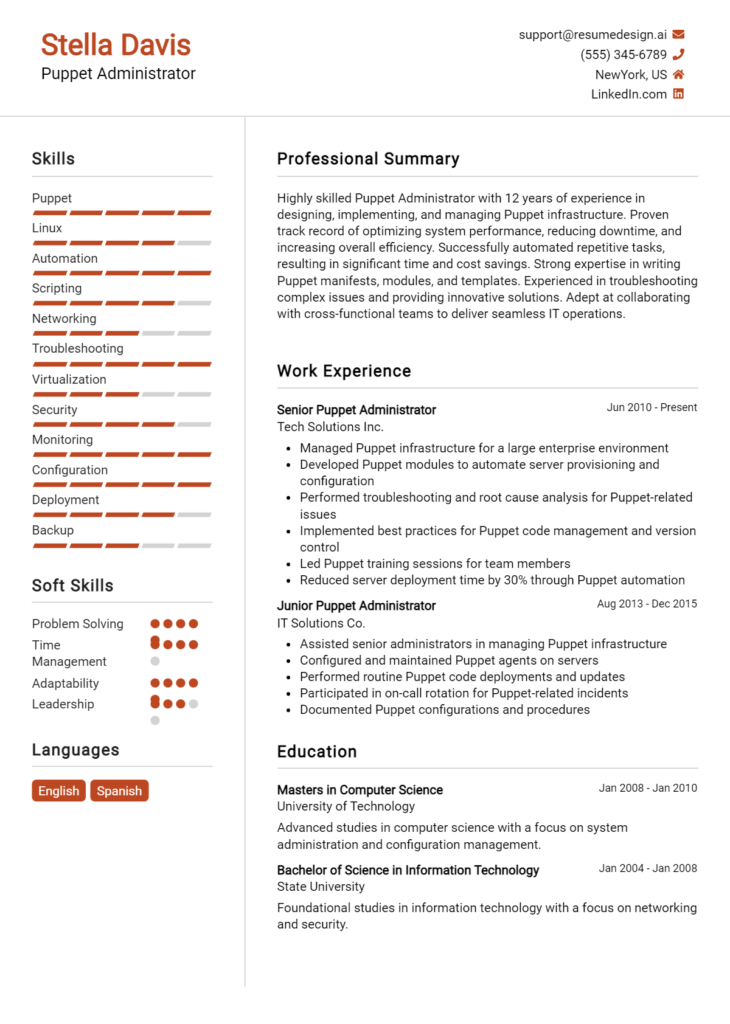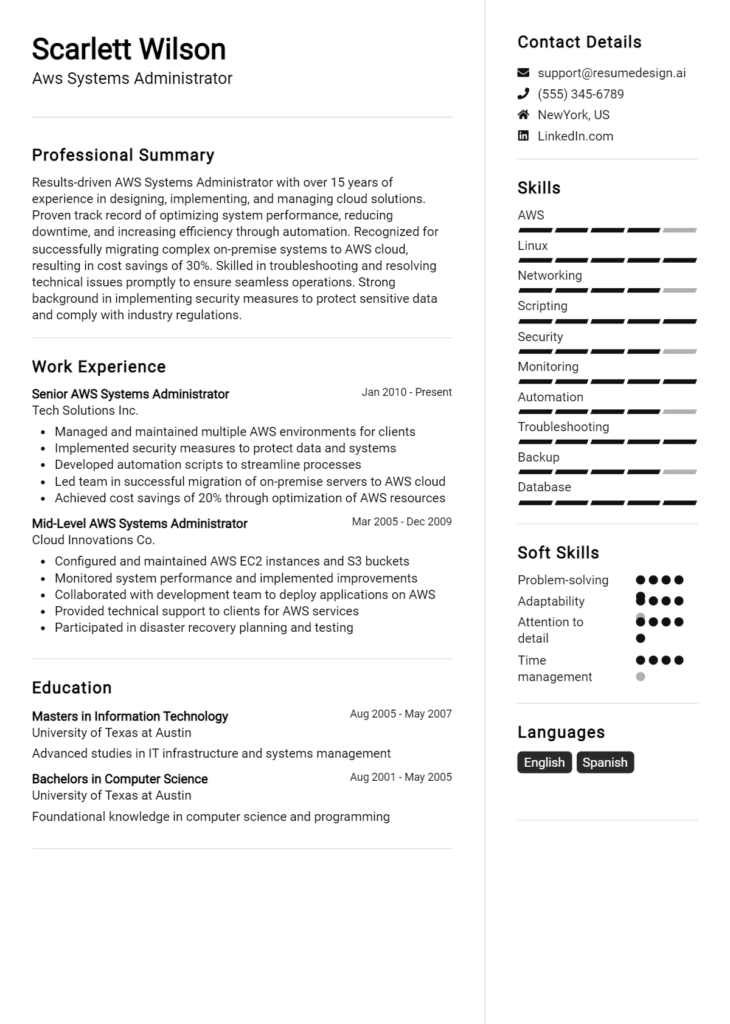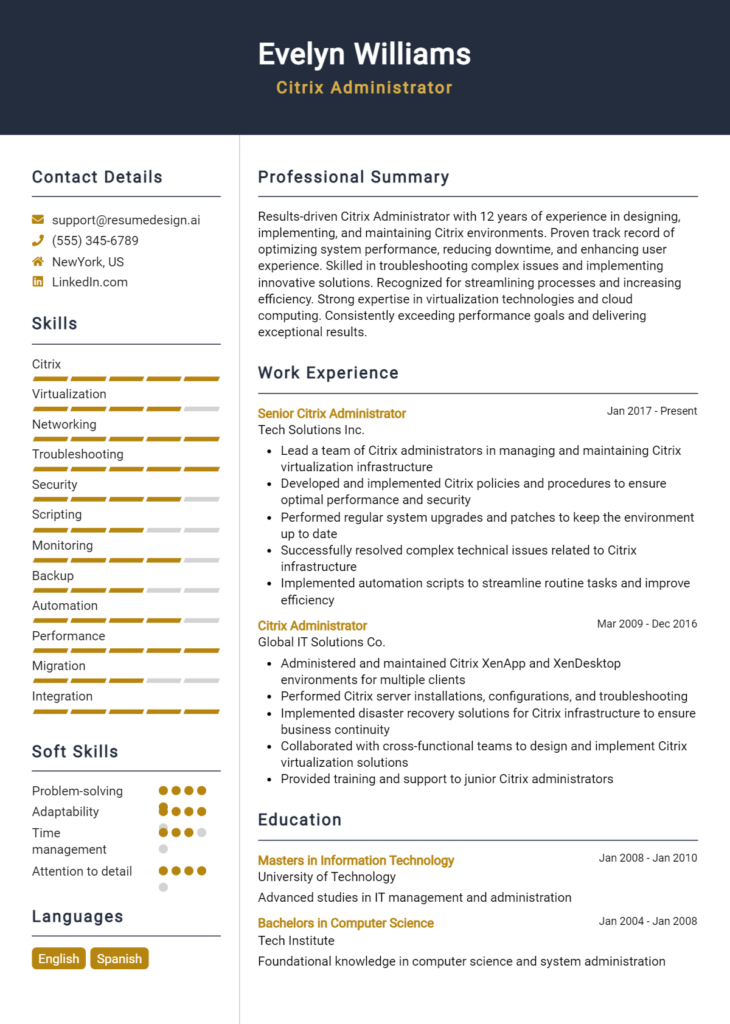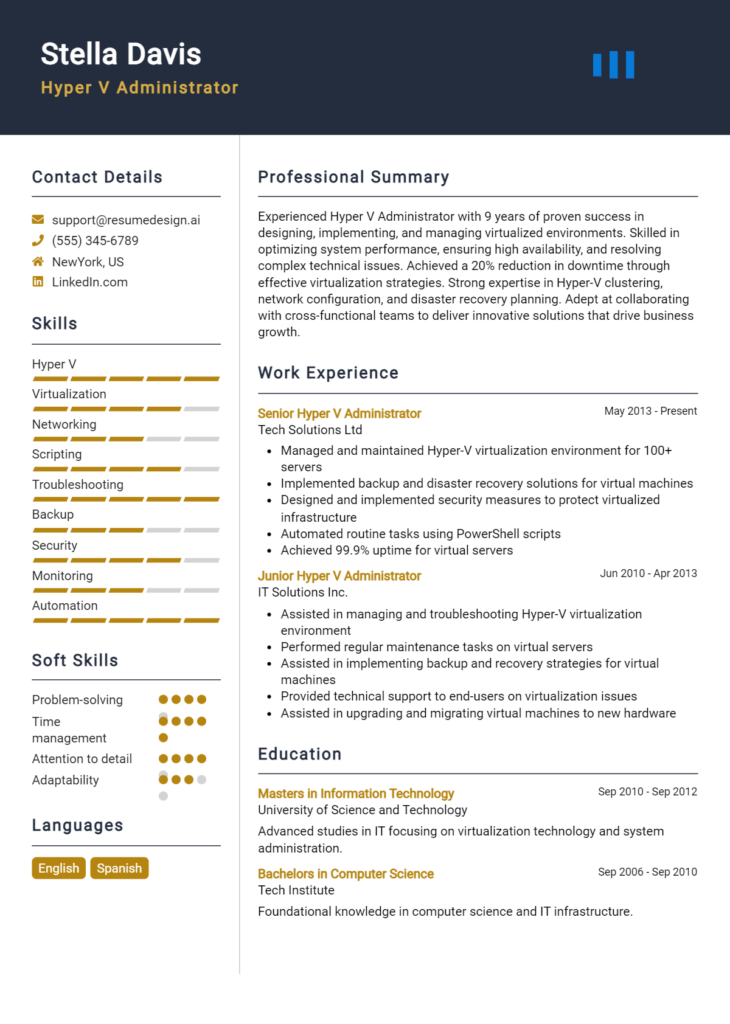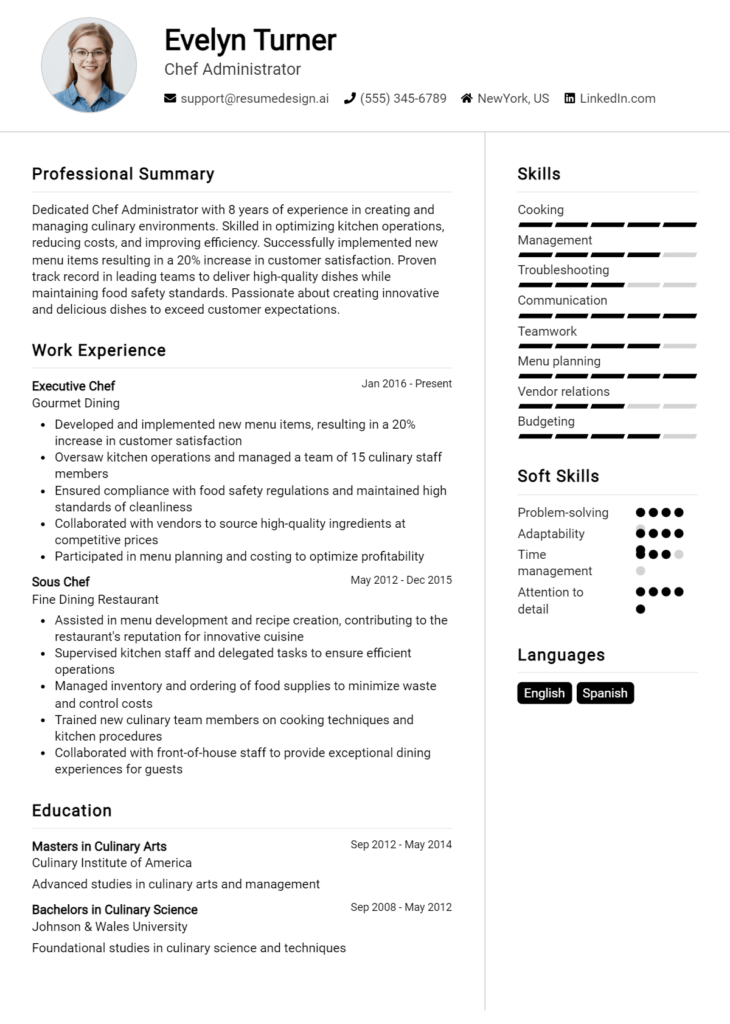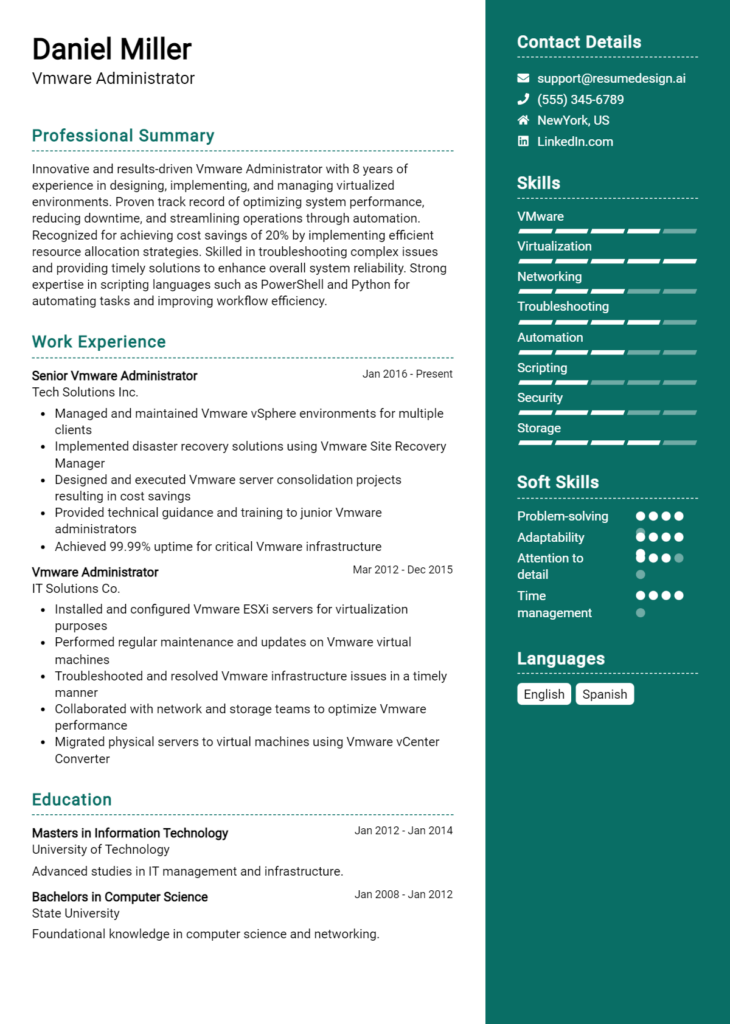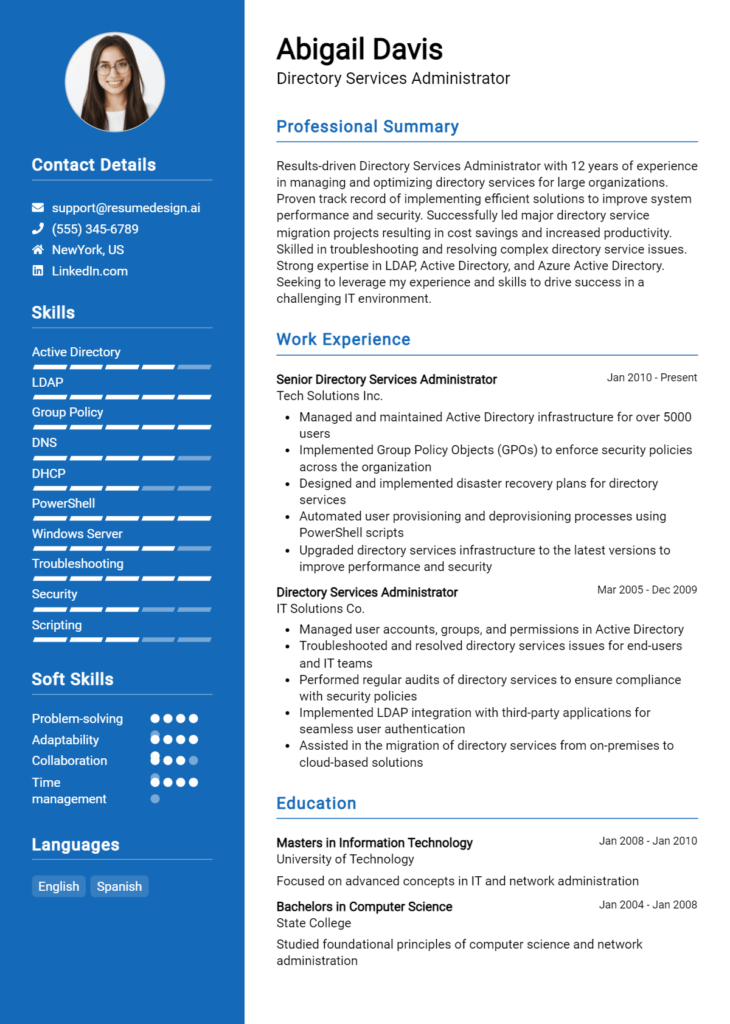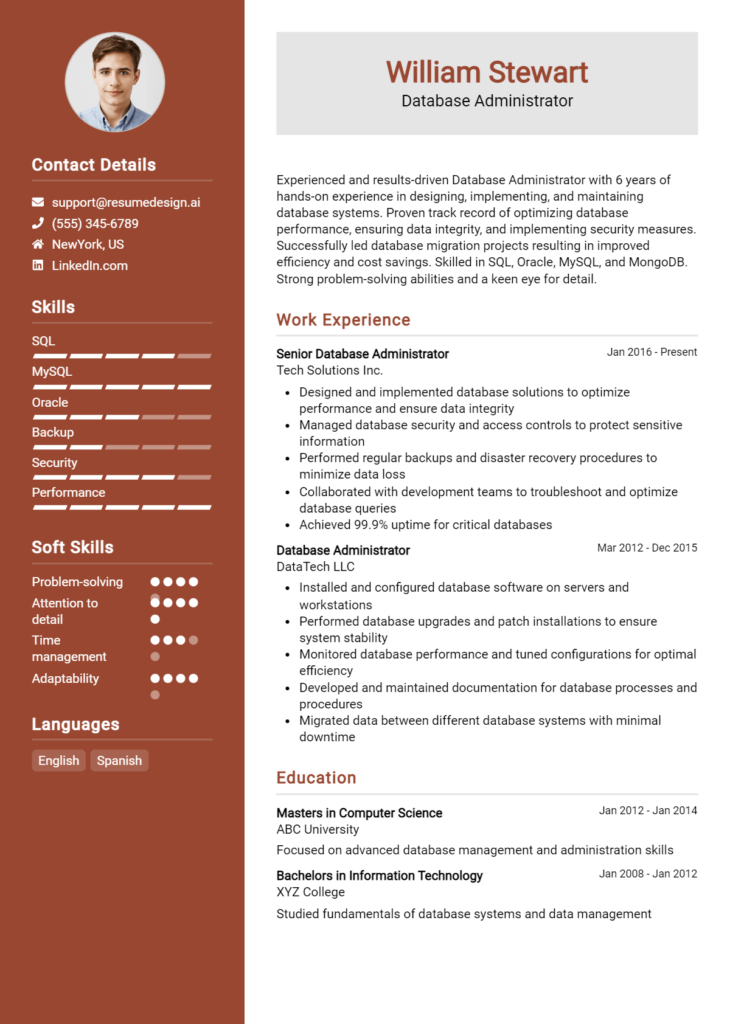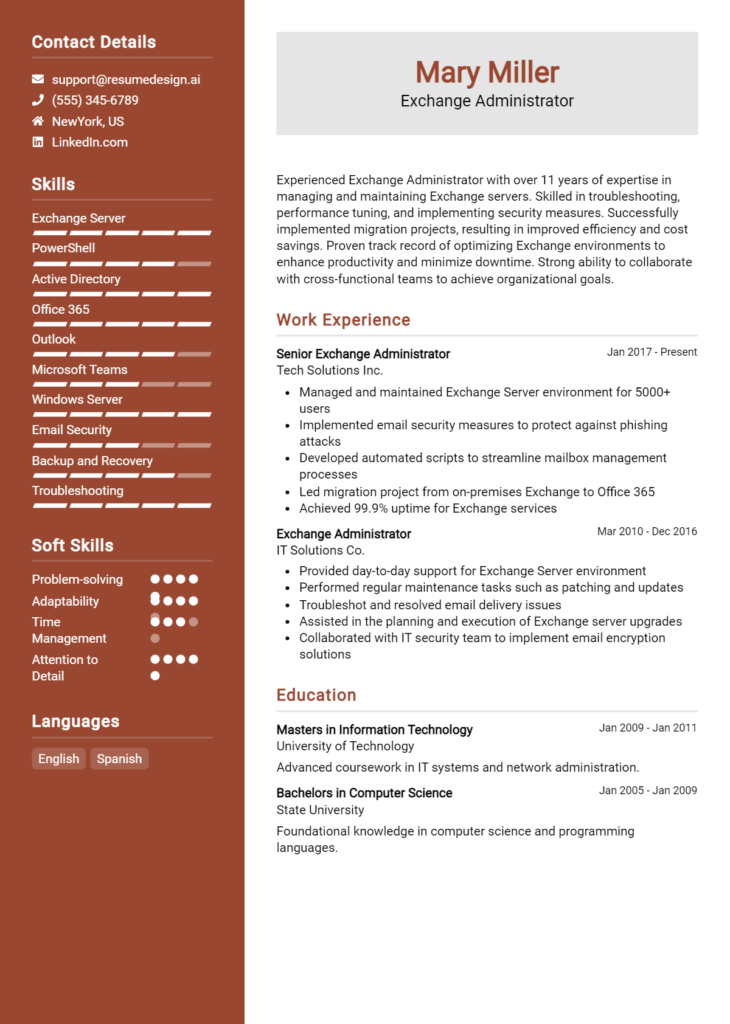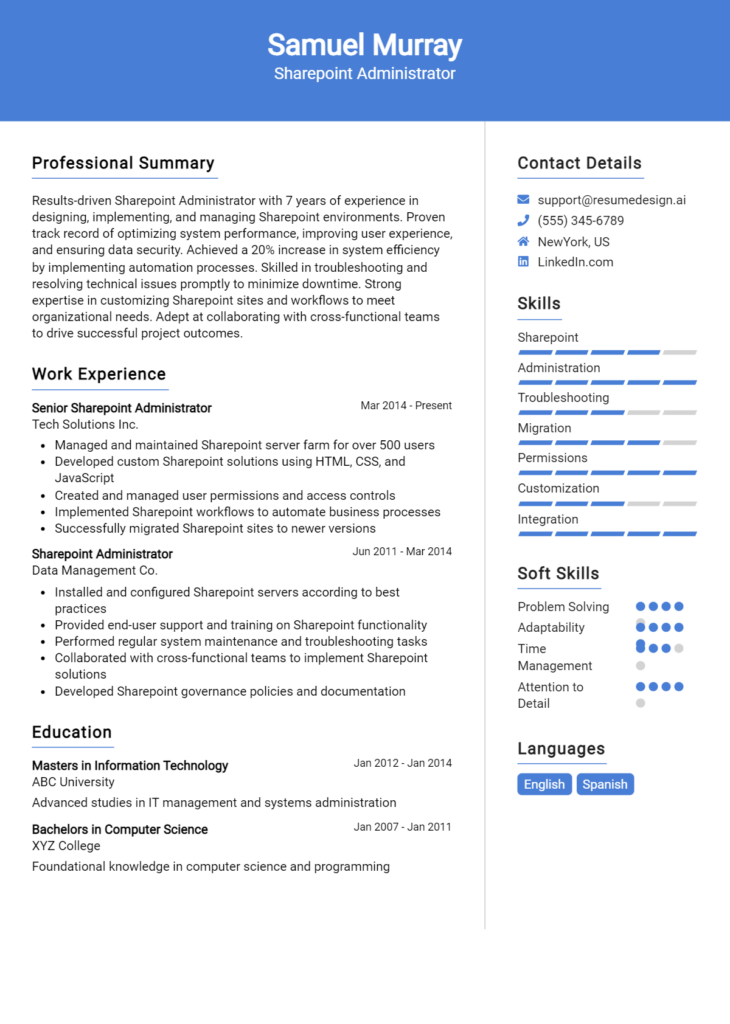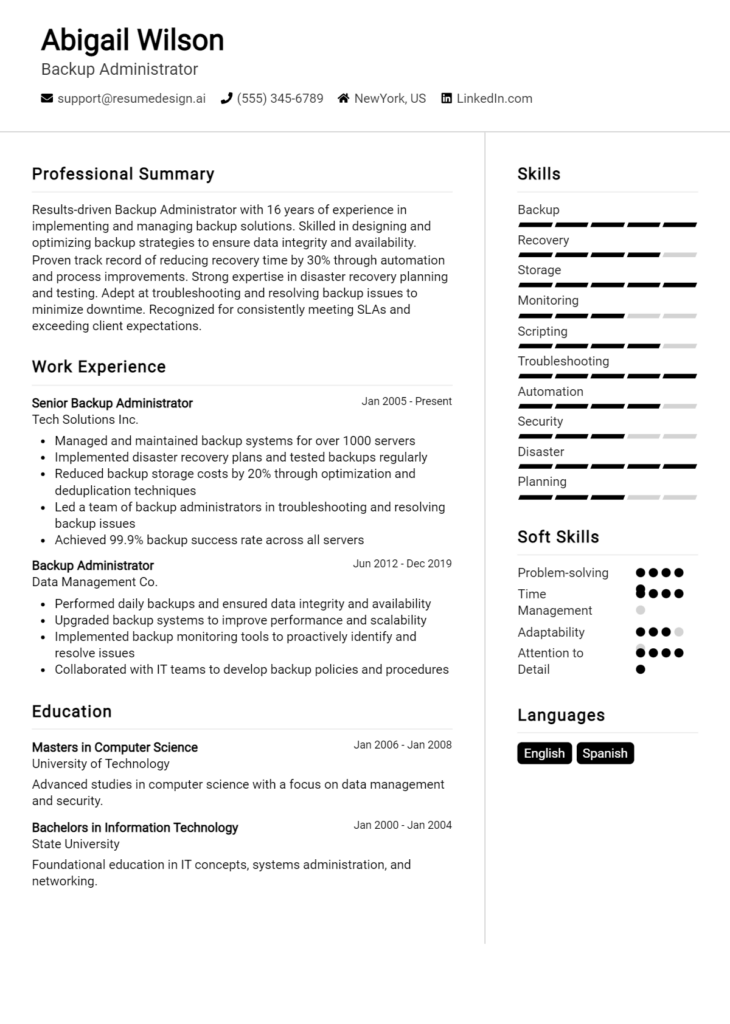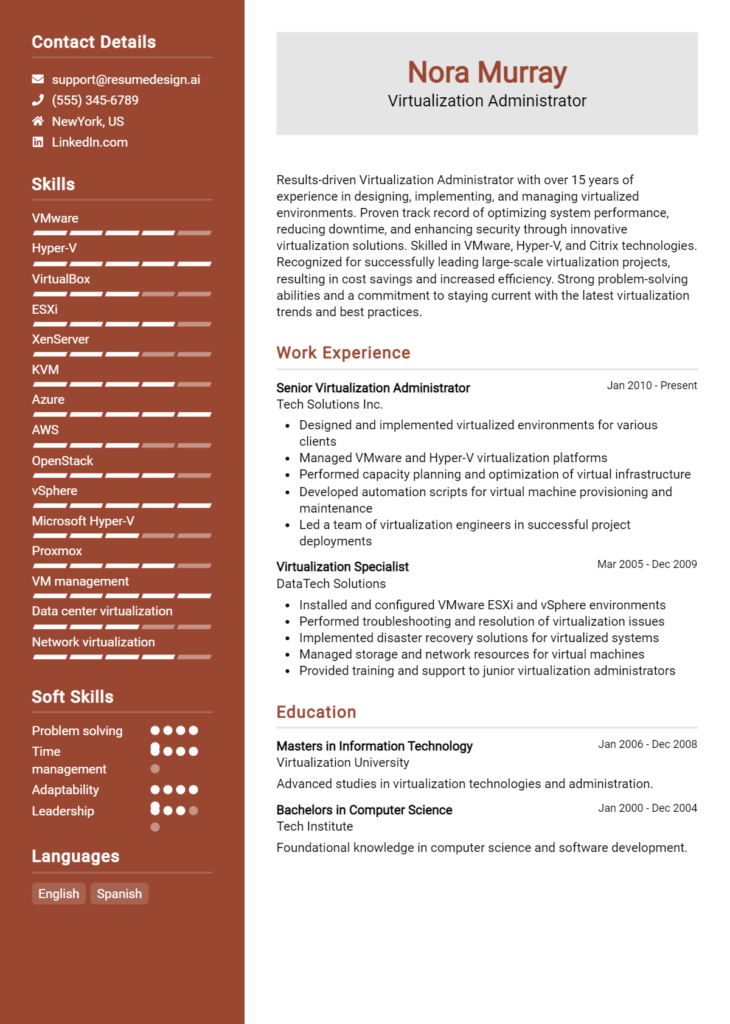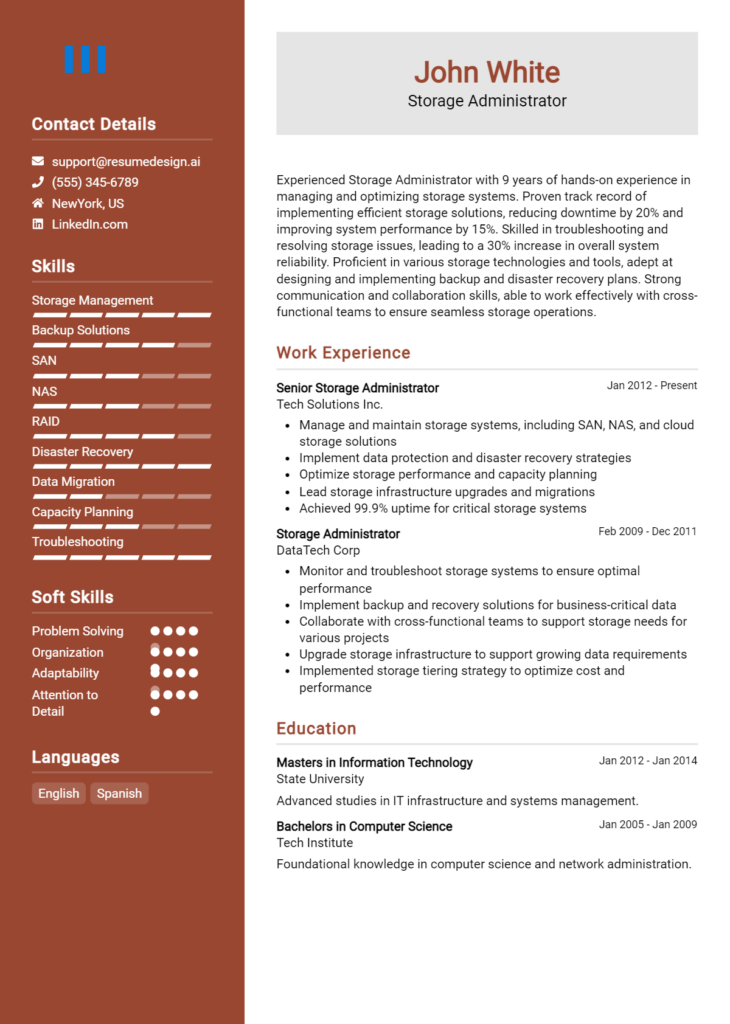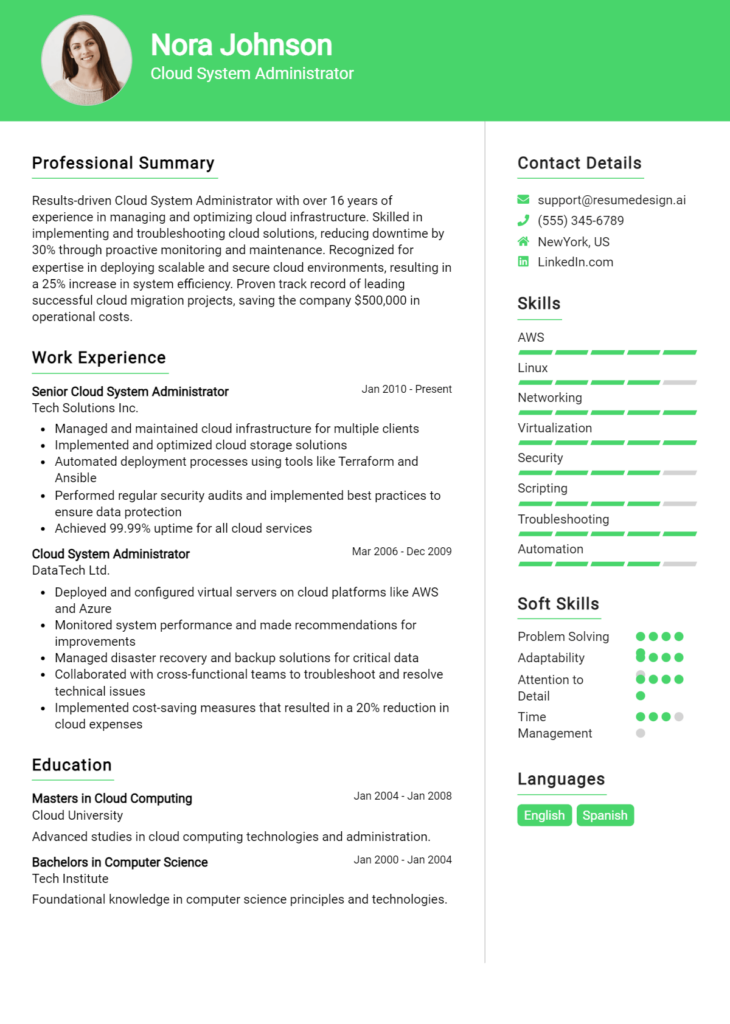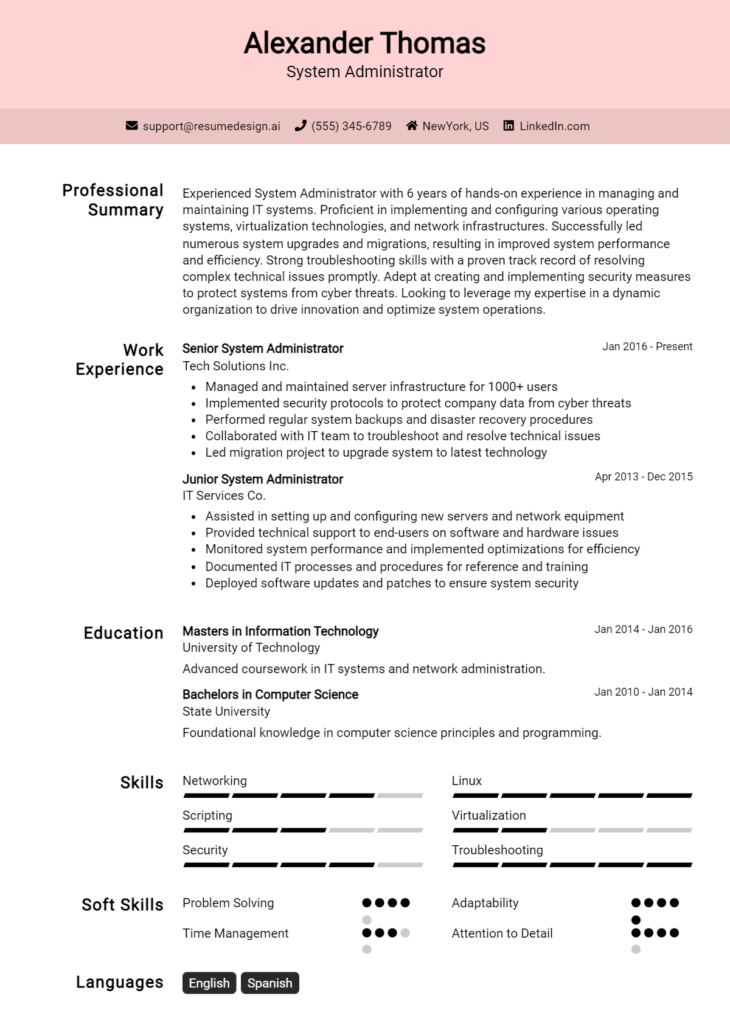Server Administrator Core Responsibilities
A Server Administrator plays a pivotal role in managing and maintaining an organization’s server infrastructure. Key responsibilities include configuring servers, monitoring performance, ensuring data security, and troubleshooting any issues that arise. This role requires technical expertise in server management, operational awareness to align with business objectives, and strong problem-solving skills to address challenges swiftly. By bridging IT with other departments, a Server Administrator significantly contributes to organizational efficiency. A well-crafted resume that highlights these qualifications can effectively showcase a candidate’s ability to support the company’s goals.
Common Responsibilities Listed on Server Administrator Resume
- Install, configure, and maintain server hardware and software.
- Monitor server performance and troubleshoot issues proactively.
- Implement security measures to safeguard sensitive data.
- Manage user access and permissions across server systems.
- Perform regular backups and disaster recovery planning.
- Ensure compliance with industry standards and regulations.
- Collaborate with other IT teams to support application deployment.
- Document server configurations and maintenance procedures.
- Conduct system upgrades and migrations as necessary.
- Provide technical support and training to staff as needed.
- Evaluate and recommend new server technologies and solutions.
High-Level Resume Tips for Server Administrator Professionals
In today's competitive job market, a well-crafted resume is essential for Server Administrator professionals looking to stand out to potential employers. Your resume is often the first impression you make, serving as a snapshot of your skills, experience, and achievements. It's crucial that it not only highlights your technical abilities but also demonstrates how you've effectively contributed to previous organizations. This guide will provide practical and actionable resume tips specifically tailored for Server Administrator professionals, ensuring that you present yourself in the best possible light to prospective employers.
Top Resume Tips for Server Administrator Professionals
- Tailor your resume to each job description by incorporating relevant keywords and phrases from the posting.
- Highlight specific server technologies and platforms you are proficient in, such as Linux, Windows Server, or cloud services.
- Showcase your relevant experience by detailing your previous roles, focusing on responsibilities that align with the job you’re applying for.
- Quantify your achievements where possible, such as mentioning the number of servers managed or uptime improvements you implemented.
- Include industry-specific certifications, such as MCSE, CCNA, or CompTIA Server+, to demonstrate your qualifications.
- Use clear and concise language, avoiding jargon that may not be recognized by all hiring managers.
- Incorporate a summary statement at the top that encapsulates your experience and what you bring to the role.
- Utilize bullet points for easy readability, making it simple for recruiters to scan your most important qualifications.
- Keep the formatting clean and professional, ensuring consistency in font, style, and layout throughout the document.
By implementing these tips, you can significantly increase your chances of landing a job in the Server Administrator field. A well-structured and targeted resume will not only showcase your technical proficiency but also convey your value as a candidate, making you a more attractive option for potential employers.
Why Resume Headlines & Titles are Important for Server Administrator
In the competitive job market for Server Administrators, a well-crafted resume headline or title can serve as a powerful tool to capture the attention of hiring managers. This brief yet impactful phrase summarizes a candidate's key qualifications, skills, and experiences, offering a snapshot of what they bring to the table. A strong headline should be concise and relevant, directly aligning with the job being applied for, thereby ensuring that the candidate stands out amidst a sea of applicants. By effectively communicating the essence of their professional identity, candidates can increase their chances of making a memorable first impression.
Best Practices for Crafting Resume Headlines for Server Administrator
- Keep it concise: Aim for a headline that is one to two lines long.
- Be specific: Use keywords related to the Server Administrator role.
- Highlight key skills: Focus on technical skills and certifications relevant to the position.
- Showcase experience: Include years of experience or notable achievements.
- Use action words: Start with strong verbs that convey your capabilities.
- Tailor to the job: Customize your headline for each application to align with the job description.
- Maintain professionalism: Ensure the tone is formal and avoids overly casual language.
- Include relevant certifications: Mention any industry-standard certifications that highlight your qualifications.
Example Resume Headlines for Server Administrator
Strong Resume Headlines
"Experienced Server Administrator with 5+ Years in Network Security and Data Management"
“Certified Microsoft and Linux Server Administrator with Proven Track Record in System Optimization”
“Dynamic Server Administrator Specializing in Cloud Infrastructure and Virtualization Solutions”
“Results-Driven Server Administrator with Expertise in Database Management and Disaster Recovery”
Weak Resume Headlines
“Server Administrator Looking for Work”
“IT Professional”
“Hardworking Individual”
Strong resume headlines are effective because they immediately convey essential information about the candidate’s qualifications, making it easy for hiring managers to recognize their potential fit for the role. They are specific and tailored, highlighting skills and experiences that resonate with the job description. In contrast, weak headlines fail to impress due to their vagueness and lack of focus, leaving hiring managers with little insight into the candidate's strengths or suitability for the Server Administrator position. A well-defined headline not only enhances visibility but also sets the tone for the rest of the resume.
Writing an Exceptional Server Administrator Resume Summary
A well-crafted resume summary is crucial for a Server Administrator as it serves as the first impression for hiring managers. In a competitive job market, a strong summary quickly captures attention by effectively showcasing key skills, relevant experience, and notable accomplishments tailored to the specific role. This brief yet impactful introduction can set the tone for the rest of the resume, highlighting the candidate's suitability for the position in a concise manner. An effective resume summary not only succinctly conveys expertise but also engages potential employers, encouraging them to delve deeper into the applicant's qualifications.
Best Practices for Writing a Server Administrator Resume Summary
- Quantify Achievements: Use specific numbers and metrics to demonstrate your impact, such as "managed 200+ servers" or "increased uptime by 30%."
- Focus on Skills: Highlight technical skills such as system administration, network security, and troubleshooting that are relevant to the job.
- Tailor the Summary: Customize your summary to align with the job description and requirements, using keywords specific to the role.
- Be Concise: Aim for 2-4 sentences that encapsulate your experience and value without unnecessary fluff.
- Showcase Relevant Experience: Include past roles or projects that directly pertain to server administration and demonstrate your capabilities.
- Highlight Certifications: Mention any relevant certifications, such as CompTIA Server+, Microsoft Certified: Azure Administrator Associate, or AWS Certified Solutions Architect.
- Use Active Language: Write in an active voice to convey confidence and proactivity in your role as a Server Administrator.
- Reflect Your Career Goals: Briefly incorporate your professional aspirations to show alignment with the potential employer's objectives.
Example Server Administrator Resume Summaries
Strong Resume Summaries
Detail-oriented Server Administrator with over 5 years of experience managing complex server environments, successfully increased system uptime to 99.9% through proactive monitoring and maintenance of over 150 servers.
Results-driven IT professional with expertise in Linux and Windows server administration; optimized server configurations that led to a 25% reduction in response time for critical applications.
Certified AWS Solutions Architect with a proven track record of deploying and managing cloud-based server solutions, improving operational efficiency by 40% and reducing costs by 20% in the last fiscal year.
Weak Resume Summaries
Experienced Server Administrator looking for a new job in IT. Good at managing servers.
Server Administrator with background in IT. Seeking to apply skills to a new position.
The strong resume summaries stand out because they are specific, quantifiable, and directly relevant to the role of a Server Administrator. They highlight measurable results and key skills that demonstrate the candidate's capability and impact in previous positions. In contrast, the weak summaries lack detail and fail to convey any significant accomplishments or skills, making them generic and less appealing to potential employers.
Work Experience Section for Server Administrator Resume
The work experience section of a Server Administrator resume is critical, as it serves as a platform to demonstrate the candidate's technical skills and their capacity to effectively manage teams while delivering high-quality IT solutions. This section is where potential employers can gauge the depth of a candidate's experience in server management, system optimization, and troubleshooting. By quantifying achievements and aligning past experiences with industry standards, candidates can showcase their ability to contribute to organizational success and highlight their readiness for the responsibilities of the role.
Best Practices for Server Administrator Work Experience
- Use specific technical terminology relevant to server administration to demonstrate expertise.
- Quantify achievements with metrics (e.g., reduced downtime by 30%, managed a team of 5).
- Highlight any leadership roles or team collaboration experiences.
- Align your experiences with industry standards and best practices.
- Incorporate keywords from the job description to pass through Applicant Tracking Systems (ATS).
- Detail specific technologies and tools used (e.g., Windows Server, Linux, VMware).
- Showcase problem-solving skills with examples of challenges faced and solutions implemented.
- Focus on continuous improvement initiatives and the impact on overall system performance.
Example Work Experiences for Server Administrator
Strong Experiences
- Led a team of 6 in the successful migration of over 500 virtual machines to a new hyper-converged infrastructure, resulting in a 40% increase in operational efficiency.
- Implemented automated backup solutions that reduced data recovery time from 24 hours to 2 hours, enhancing data availability and resilience.
- Designed and executed a network security policy that decreased unauthorized access attempts by 70%, significantly improving system integrity.
- Collaborated with cross-functional teams to deploy a monitoring system that identified and resolved 95% of system anomalies within 10 minutes.
Weak Experiences
- Worked on server maintenance and support tasks as needed.
- Assisted in various IT projects without specifying my contributions.
- Participated in team meetings and shared input on server issues.
- Helped with general troubleshooting of system problems.
The examples of strong experiences are considered impactful because they highlight specific achievements, demonstrate leadership, and provide quantifiable results that reflect the candidate's contributions to the organization. In contrast, the weak experiences lack detail and specificity, making it difficult for employers to gauge the candidate's actual skills and impact, which ultimately diminishes their appeal in a competitive job market.
Education and Certifications Section for Server Administrator Resume
The education and certifications section of a Server Administrator resume is crucial as it serves to showcase the candidate's academic qualifications and professional development in a rapidly evolving field. This section not only highlights relevant degrees but also emphasizes industry-recognized certifications and continuous learning efforts that are essential for success in server administration. By providing details on relevant coursework, certifications, and specialized training, candidates can significantly enhance their credibility and demonstrate their alignment with the requirements of the job role, ultimately making a compelling case to potential employers.
Best Practices for Server Administrator Education and Certifications
- Prioritize relevant degrees, such as Computer Science, Information Technology, or Network Administration.
- List industry-recognized certifications, such as CompTIA Server+, Microsoft Certified: Azure Administrator Associate, or Cisco Certified Network Associate (CCNA).
- Include specialized training or workshops that focus on emerging technologies and methodologies in server management.
- Provide details on key coursework that directly relates to server administration, including networking, system architecture, and security protocols.
- Indicate the dates of completion for certifications and education to show currency in knowledge and skills.
- Highlight any honors or distinctions received during your educational journey to stand out from other candidates.
- Consider including professional development courses or online training that showcases your commitment to lifelong learning.
- Ensure that the information is presented in a clear, organized manner for easy readability by hiring managers.
Example Education and Certifications for Server Administrator
Strong Examples
- Bachelor of Science in Computer Science, XYZ University, 2020
- CompTIA Server+ Certification, 2022
- Microsoft Certified: Azure Administrator Associate, 2021
- Coursework: Network Architecture, Advanced Server Management, and Database Administration
Weak Examples
- Associate Degree in Arts, ABC College, 2019
- Certification in Basic Computer Skills, 2018
- High School Diploma, 2015
- Old Certification in Windows Server 2003, expired 2015
The examples listed as strong are relevant and demonstrate a clear alignment with the skills and knowledge required for a Server Administrator role. They reflect a candidate's commitment to the field through advanced education and recognized certifications. Conversely, the weak examples lack relevance to the specific requirements of server administration and include outdated or less recognized qualifications that do not contribute effectively to the candidate's profile.
Top Skills & Keywords for Server Administrator Resume
As a Server Administrator, possessing the right skills is crucial not only for securing a position but also for excelling in the role. A well-crafted resume that showcases both hard and soft skills can significantly enhance your chances of standing out in a competitive job market. Employers look for candidates who not only have the technical prowess to manage and maintain servers but also possess the interpersonal skills necessary to work collaboratively within a team and communicate effectively with stakeholders. Highlighting these skills in your resume can demonstrate your capability to handle both the technical and relational aspects of the job, ultimately making you a more attractive candidate.
Top Hard & Soft Skills for Server Administrator
Soft Skills
- Effective Communication
- Problem-Solving
- Team Collaboration
- Time Management
- Attention to Detail
- Adaptability
- Critical Thinking
- Customer Service Orientation
- Stress Management
- Conflict Resolution
Hard Skills
- Server Configuration and Management
- Network Protocols (TCP/IP, DNS, DHCP)
- Virtualization Technologies (VMware, Hyper-V)
- Cloud Computing (AWS, Azure)
- Backup and Recovery Solutions
- Security Protocols and Best Practices
- Scripting Languages (PowerShell, Bash)
- Monitoring Tools (Nagios, Zabbix)
- Database Management (SQL, NoSQL)
- Operating Systems (Linux, Windows Server)
By emphasizing these skills and detailing your work experience, you can create a compelling resume that effectively showcases your qualifications as a Server Administrator.
Stand Out with a Winning Server Administrator Cover Letter
Dear [Hiring Manager's Name],
I am writing to express my interest in the Server Administrator position at [Company Name], as advertised on [where you found the job listing]. With over [X years] of experience in managing and optimizing server environments, I am confident in my ability to contribute effectively to your team and ensure the seamless operation of your IT infrastructure. My background in both Linux and Windows server administration has equipped me with a robust understanding of system performance, security protocols, and cloud integration.
In my previous role at [Previous Company Name], I successfully managed a fleet of over [X] servers, implementing monitoring solutions that reduced downtime by [X%] and optimized resource allocation. My expertise in troubleshooting complex server issues and executing routine maintenance tasks has allowed me to enhance system reliability and user satisfaction. Additionally, I have a proven track record of collaborating with cross-functional teams to deploy new applications and services, ensuring that they meet performance and scalability requirements.
I am particularly drawn to this opportunity at [Company Name] because of your commitment to innovation and excellence in technology solutions. I am eager to bring my skills in server virtualization, backup and disaster recovery, and security compliance to your organization. I thrive in fast-paced environments and am dedicated to continuous learning to stay ahead of industry trends, which I believe is essential for any successful Server Administrator.
Thank you for considering my application. I look forward to the possibility of discussing how my experience and skills align with the goals of [Company Name]. I am excited about the opportunity to contribute to your team and help maintain the high standards of your server infrastructure.
Sincerely,
[Your Name]
[Your Contact Information]
Common Mistakes to Avoid in a Server Administrator Resume
When crafting a resume for a Server Administrator position, it's essential to present your skills and experiences effectively. However, many candidates make common mistakes that can hinder their chances of landing an interview. By being aware of these pitfalls, you can create a polished resume that highlights your qualifications and stands out to potential employers. Here are some key mistakes to avoid:
Generic Objective Statement: Using a one-size-fits-all objective can make your resume feel impersonal. Tailor your objective to reflect your specific career goals and how they align with the company’s mission.
Overloading with Technical Jargon: While it's important to showcase your technical skills, overusing jargon can confuse hiring managers. Aim for clarity and balance technical terms with explanations that highlight your expertise.
Neglecting Soft Skills: Server Administration isn’t just about technical abilities. Failing to mention soft skills like teamwork, communication, and problem-solving can give a skewed perception of your capabilities.
Irrelevant Experience: Including unrelated job experiences can dilute the focus of your resume. Stick to roles and responsibilities that directly relate to server administration to keep the document concise and relevant.
Lack of Quantifiable Achievements: Simply listing duties without context can make your achievements seem less impressive. Use metrics and specific examples to demonstrate how you've positively impacted past employers.
Ignoring Formatting Consistency: A cluttered or inconsistent format can make your resume hard to read. Use a clean, professional layout with consistent font sizes and styles to enhance readability.
Grammatical Errors: Typos and grammatical mistakes can give a negative impression of your attention to detail. Always proofread your resume or have someone else review it for errors before submission.
Omitting Relevant Certifications: Server Administrators often require specific certifications. Failing to list relevant certifications can make you appear underqualified. Ensure you highlight any important certifications prominently on your resume.
Conclusion
As a Server Administrator, your role is critical in maintaining the health and performance of servers, ensuring seamless operation in various environments. Key responsibilities often include monitoring server performance, implementing security measures, managing backups, and troubleshooting issues. Furthermore, a strong understanding of networking, database management, and system optimization is essential to excel in this position.
In the ever-evolving tech landscape, staying updated with the latest tools and technologies is paramount. Continuous learning and certification can significantly enhance your qualifications and make you a more competitive candidate.
As you reflect on your career as a Server Administrator, it's crucial to ensure your resume effectively highlights your skills and experiences. A well-crafted resume can set you apart in a competitive job market. We encourage you to take the time to review your Server Administrator Resume and make necessary updates.
To assist you in this process, a range of resources is available: explore resume templates for formatting ideas, utilize the resume builder for a streamlined creation process, and check out resume examples for inspiration. Additionally, don't forget to enhance your application with a strong introduction by using cover letter templates.
Take action today to ensure your resume reflects your expertise and positions you for success in your career as a Server Administrator!

